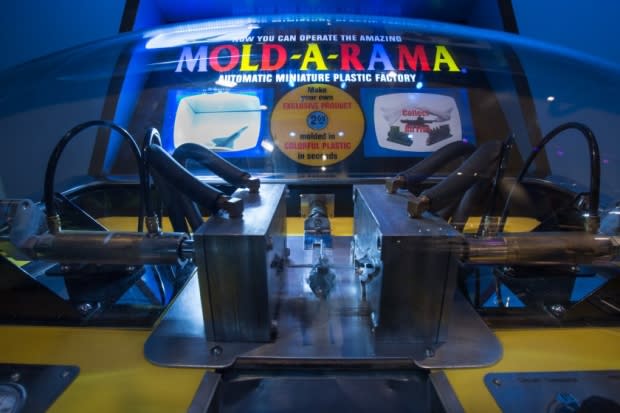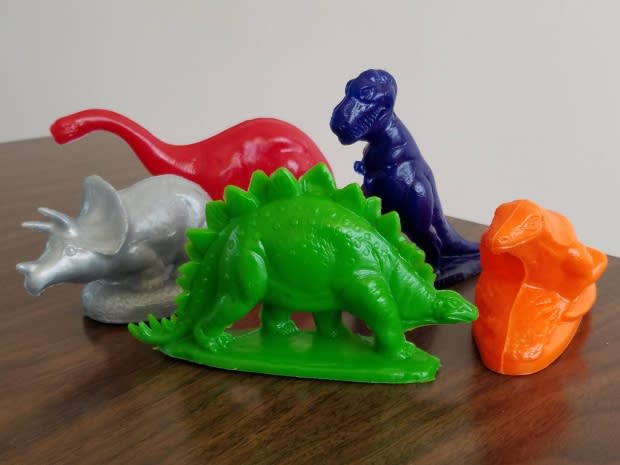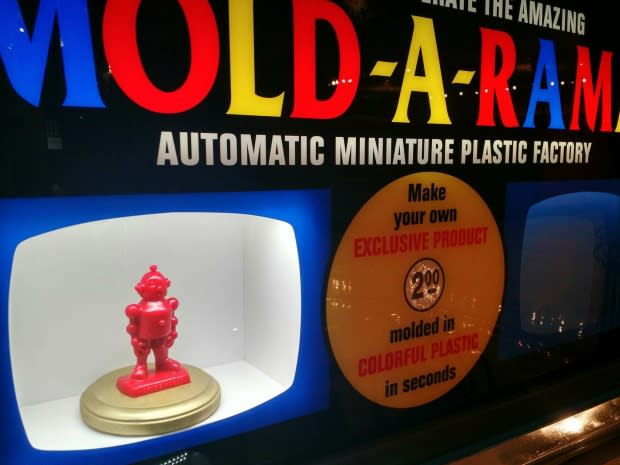Mold-a-Rama drama: B.C. company sued over role in modifying vintage machines
A paper dollar bill crinkles through the slot on the arcade machine. A glowing button is pressed. Two pistons stamp together to make a mould and molten plastic pours into the cast. Less than a minute later, the pistons pull apart and a colourful, waxy, fits-in-the-palm-of-your-hand Triceratops model is pushed into a delivery slot — already cooled.
Or a polar bear drops. A steam engine. The U.S. Capitol building. The trio of monkeys that see no evil, hear no evil and speak no evil.
Depends which machine you've found.
Only 200 Mold-A-Rama vending machines were ever made. They make plastic, souvenir figurines and the first debuted at the 1962 World Fair in Seattle at 25 cents a pop.
Today, fervent collectors will spend hundreds on the rarest original figureheads.

Mold-A-Rama is a family run company — one of only two — keeping about 60 of the vintage machines running
It's suing a B.C.-based collector for, it claims, helping a big-time collector buy several of its original machines only to desecrate them with modern parts before trying to resell them under the Mold-A-Rama trademark.
'The machines ... are no longer Mold-A-Rama'
William A. Jones started the Mold-A-Rama company when he bought his first machine in 1971. The family owns the trademark now, maintaining and preserving the machines at zoos and museums around the U.S. Midwest.
Each one makes something different, unique to its location.
William's son, Paul, has taken over the business. The goal is to keep the machines in working order while preserving the vintage, '60s feel — and nostalgia factor — as much as possible.
Several years ago, according to the lawsuit filed in Illinois, a collector named Bruce Weiner bought several of the machines from the Joneses to add to his collection, with the help of Maple Ridge-based company Collector-Concierge International (CCI).

Afterward, the Joneses say, Weiner "replaced integral components of the machines with modern, non-Mold-A-Rama parts."
"As a result," the lawsuit says, "the machines … are no longer Mold-A-Rama venching machines. Instead, the machines are new products."
The Jones family also says CCI is helping Weiner market the "new" machines for sale under the Mold-A-Rama name — including, they say, by posting a promotional video online.
Its claim also says Mike Hasanov — who works with CCI — advertised the "fully restored" machines for sale on his own Facebook page on Oct. 23.

The family's lawsuit was filed in December. It said the family sent cease and desist letters to CCI, Weiner and Hasanov last fall, saying they "no longer" had "the right" to call the machines Mold-A-Ramas.
None of the defendants responded to CBC's request for comment by deadline. A statement of defence has yet to be filed.

